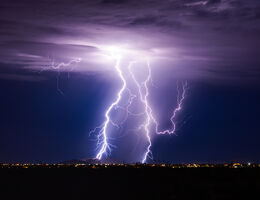
April 22, 2024—Spring showers bring lovely flowers, but spring storms can lead to increased asthma symptoms.
Rain can be a good thing for many people with asthma, because it cleanses the air of allergens. But rain, high humidity and sudden weather changes can also trigger asthma symptoms, according to the Asthma and Allergy Foundation of America (AAFA).
And when severe storms strike, people with asthma might experience an unexpected trigger. In certain conditions, thunderstorms can lead to an increase in asthma attacks—a phenomenon called "thunderstorm asthma."
A perfect storm
In November 2016, major thunderstorms shook Melbourne, Australia. According to a review of the event in JAMA, within about a day, more than 3,300 people went to the emergency department with acute symptoms of asthma.
Similar spikes in asthma symptoms after severe storms have happened in countries around the world, including the United States.
According to the report in JAMA, the explanation may be tiny particles of pollen and mold. In Melbourne, a cold downdraft concentrated the pollens and mold spores. Then they were swept into the clouds, where they broke apart into easy-to-inhale particles. High winds blew those particles over the city.
Controlling asthma in rough weather
Fortunately, thunderstorm asthma isn't common. The right combination of factors has to exist to cause widespread reactions like those in Melbourne.
But weather—including storms—can trigger asthma flare-ups for individuals. And storms and wind can spread pollen or break it into smaller pieces, where it may be easier to inhale.
You can't control the weather. But this advice from the American Academy of Allergy, Asthma & Immunology, the AAFA and other experts can help you prepare. Keep an eye on forecasts. And try these tactics to help avoid storm-related symptoms:
- Stay indoors. When the skies threaten a thunderstorm, go inside and close the windows.
- Know your triggers. Understanding what makes your asthma worse can help you prepare for and prevent flare-ups.
- Take medication as directed. Make sure you have enough short-acting medication on hand during bad weather, wildfires and high air pollution days.
If you have questions about your asthma action plan and how to manage asthma triggers, talk with your doctor. And learn more about living well with asthma in our Asthma health topic center.
Sources
- American Academy of Allergy, Asthma & Immunology. "Your Questions Answered on Air Pollution and Asthma." https://www.aaaai.org/tools-for-the-public/conditions-library/asthma/your-questions-answered-on-air-pollution-and-asthm.
- American Lung Association. "Can a Thunderstorm Trigger an Asthma Attack?" https://www.lung.org/blog/can-a-thunderstorm-trigger-asthma.
- Asthma and Allergy Foundation of America. "Weather." https://aafa.org/asthma/asthma-triggers-causes/weather-triggers-asthma.
- JAMA. "Thunderstorm Asthma and Climate Change." https://jamanetwork.com/journals/jama/article-abstract/2815452.
- UpToDate. "Trigger Control to Enhance Asthma Management." https://www.uptodate.com/contents/trigger-control-to-enhance-asthma-management.